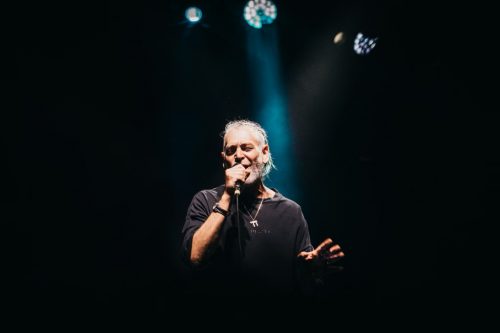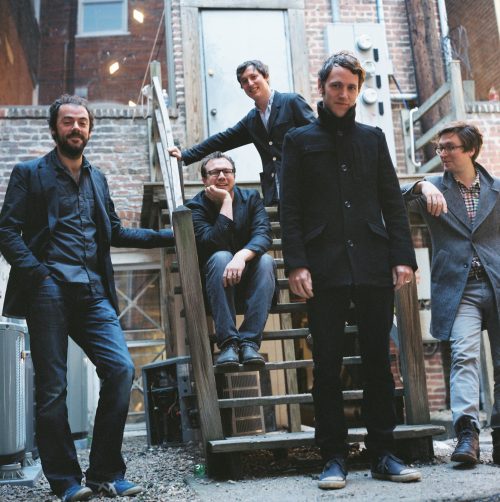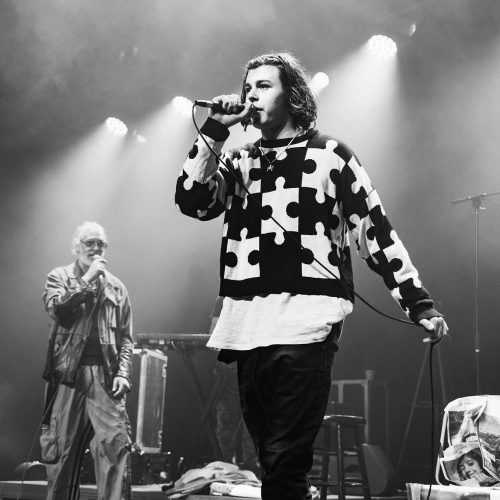Matisyahu, the reggae rapper whose Jewish faith is a major component of his music and life, has not set out to preach on his Hold The Fire tour.
“I’m doing music, right, so I’m not going go be making speeches during my shows, but I am who I am, and it is at the forefront of my entire being right now and I reek of it, so it’s going to come out,” he tells us from a dressing room in Pensacola before the first show of the tour.
Before he called himself Matisyahu and found the Hasidic lifestyle, Matthew Miller was raised within his religion, attending Hebrew school and making Bar Mitzvah in White Plains, NY. When his profile began to grow, the image of a tall man in Hasidic dress rapping was a unique, even shocking, thing for many to behold. His 2006 album “Live at Stubb’s,” which included the single “King Without a Crown” made him a staple on the jam band and festival circuit.
Matisyahu’s look is now more West Coast chill, but his Jewish identity still burns bright on his new EP, “Hold The Fire.” He visited Israel in January, where he played a sold-out show in Tel Aviv to benefit hostage families. In November, he made a surprise appearance at the March for Israel in Washington, DC, where he performed his anthem “One Day” with The Maccabeats. The heat around the reaction in America to the war in Gaza was the alleged reason for the cancellation of three of his dates on the tour this spring.
We chatted with Matisyahu in advance of his concerts this weekend at Brooklyn Bowl in Philadelphia (Friday, March 22) and Brooklyn Steel (Friday, March 23).
You’ve based the EP on the four earth elements. How did you come up with that concept?
The concept is from a dream I had quite a few years ago but it stayed with me and is especially relevant right, now and I call it The Hope of Fire. I was in a synagogue in the Middle East in ancient times, and I was praying and I was playing with a tiger, and the mother tiger was shooting fire out of her eyes at me and I was on fire, engulfed, and then I realized that I wasn’t burning and I thought of the burning bush, and I looked down at my hands and I saw that I was made out of water and I thought about the concept of Moshe (Moses) being drawn from the water, because he was taken from the water from pharaoh’s daughter, and I thought of that idea and the idea that artists burn out, like the 27 or whatever age, and especially with the times, all of these young artists who are dying of overdoses of fentanyl or getting shot or robbed, and just the idea of sustainability and stamina as an artist and what that takes to kind of stay ignited but not catch on fire and the balance between water and humility and all those things, so that became kind of central to me for these songs.
The song “Fireproof” seems to resonate with the events of October 7. Did you write that song before or after the attack in Gaza?
Before. All the songs really, really connect to what’s going on now in terms of Jewish identity and antisemitism in terms of the crisis that we’re facing. It’s interesting, because a lot of my older songs from the original albums, as I’m singing them now on tour, a lot of them are metaphors, but as I’m saying the words they kind of connect to this ancient idea that connects with the Jewish people of survival and struggle and loss and inspiration and divinity and miracles. It’s the story of our people, and that’s sort of been the main dish that I served up over the years, and as time went on it became a little less central to my focus [and it shifted to] more of a focus on my human experience of being a father and in a relationship and touring, and all of the different things of being a human became the focus of the last few albums. But with this album, even though most of it was written six months to a year ago probably, it all just really connects with what’s going on in the world.
I was following along on Instagram during your visit to Israel. I’m sure you’ve seen some things that we don’t see on the news. What would you like people to know about what’s going on there?
I would say a couple of things. It feels pretty hopeless for Jews right now in America, just with the notion that the younger generation has no concept of historical context of antisemitism or the Jewish people and who and what we are and what we’ve been through, and trying to like feel like you have to convince the world of something that’s very basic is a daunting feeling. I would say that when I was in Israel that kind of got replaced with this feeling of hope based on the resilience and incredible sprit of the Israeli people, Jew and not Jew. That made me reconnect to this idea that this isn’t the first time that we’ve been through this. We’ve been through this forever and we are a divine people; whether you’re atheist or not there is something miraculous to our existence and who we are as a people. We’ve had our ups and downs and definitely had our moments but there’s something very special, and unfortunately it always seems to be darkness that’s the thing that really squeezes the light out of us, and that’s a really horrible thing and it seems to be the reality though. And I was able to feel some of that light when I was in Israel and that was very special.
I guess in coming back to America now and going out in front of American audiences that are mostly not Jewish, may or may not be supporters of Israel, I’m doing music, right, so I’m not going go be making speeches during my shows but I am who I am and it is at the forefront of my entire being right now and I reek of it, so it’s going come out. It’s going to come out in the music. And hopefully it’s going to come out in a deep way that won’t be an explanation to people for their brains but will be in a way of feeling and will touch people and will help people understand what we’re going through through a very personal…through me, through the music and stuff, the lyrics, the words and all that. I guess other than that the main thing people don’t talk about is October 7. Standing in the kibbutzim and hearing the stories of the survivors and hanging out in hospitals with survivors in wheelchairs and soldiers on the front lines who are my sons’ ages, I mean. I would say that that’s kind of the main thing, people just have no idea what the hell happened on that that day.
Was your life in danger in Israel? Were you hearing rockets or bombs?
Not really. The first day we were down by Gaza down by those kibbutzim that are not very far at all, a couple football fields away from Gaza, and there was fighting going on, so you’re hearing explosions and you’re seeing smoke kind of go up in the air, but I never felt like I was in danger really. In Tel Aviv and Jerusalem, when I was there, in those moments it felt like there was not even a war going on.
What do New York shows mean to you?
My first shows ever were in New York. Not ever, but as Matisyahu and even before that when I was in college and playing open mic nights at the Lion’s Den and different places. But the first show I remember, I think it was at Southpaw in Brooklyn and we opened up for a great reggae band called John Brown’s Body and I just remember that experience. I remember playing the Bowery Ballroom and the Ropeadope [record label] thing and watching other musicians who were on tour, and I was just getting permission to come out of yeshiva to play shows, and my first show at Southpaw that was my own show and there was a sold-out audience and the disbelief, and going straight from there to Irving Plaza and all those legendary spots, Hammerstein Ballroom, so New York shows have always been powerful and always feel like hometown shows and always got family and friends and label people and it’s always been special.
You’re donating a dollar from each ticket sold on this tour to the Last Prisoner Project. Why?
It’s an important cause. There are people locked up for smoking weed, which we all know is an archaic notion, and their lives have been destroyed. And even though the rest of the world has pretty much moved on and realized it’s not a crime, there are still people whose lives are ruined by it, and me being a smoker on and off for many, many years, I feel it could’ve easily happened to me on the other side of that situation, so it’s something I feel a connection to and glad to help.




Leave a Reply